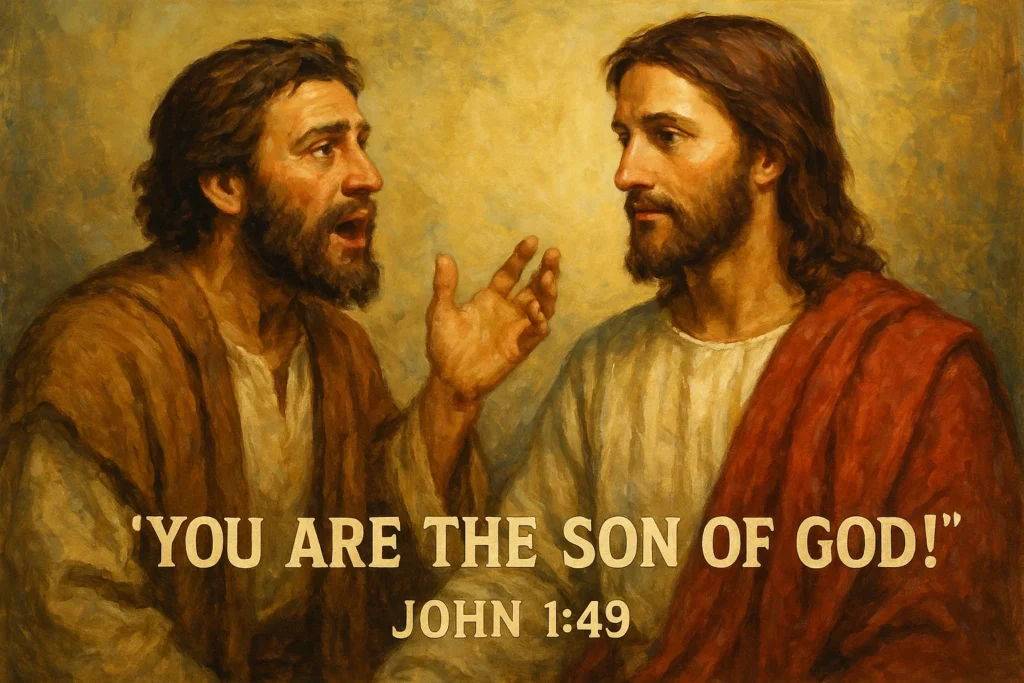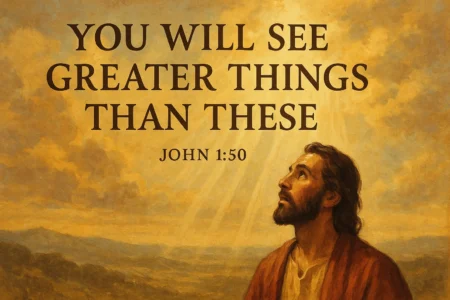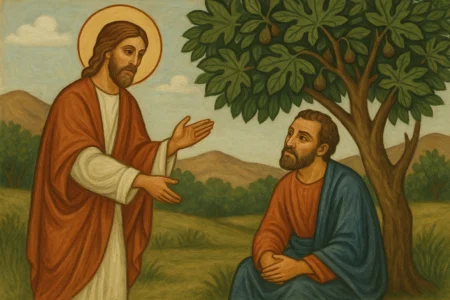It’s one of the most stunning turnarounds in the entire Bible. One minute, a man named Nathanael is chilling under a fig tree, just minding his own business. The next, he’s standing in front of a total stranger from a town he can’t stand, and words are tumbling out of his mouth that will echo for eternity: “Rabbi, You are the Son of God! You are the King of Israel!”
What just happened?
What could possibly shatter a man’s deeply held skepticism in a single instant? This isn’t just a casual compliment. This is a radical, life-altering, and, let’s be honest, dangerous thing to say in first-century Judea. This single verse, John 1:49, is a hinge. It swings the door of the Gospel of John wide open. We’re moving from Jesus gathering his first few followers to the full-blown revelation of who He is.
This moment has always floored me. As someone who leans toward skepticism myself, I really get Nathanael. His story is a powerful reminder of what a personal encounter can do. To truly get the John 1:49 meaning, we have to do more than just read the verse. We need to walk that dusty road with his friend Philip. We need to feel the shade of that fig tree. We need to stand in his sandals and feel the absolute shock of being truly seen.
So let’s dive deep into one of the most dramatic character intros ever and unpack the profound meaning packed into Nathanael’s world-changing confession.
More in John Chapter 1 Category
Key Takeaways
- Nathanael’s Confession is a Climax: His declaration in John 1:49 is the high point of the opening chapter. It pulls together all the titles given to Jesus so far (Lamb of God, Messiah, Rabbi) and adds the ultimate ones: “Son of God” and “King of Israel.”
- The “Fig Tree” was the Catalyst: Jesus’s supernatural knowledge—seeing Nathanael in his private, unobserved moment of devotion—was a sign so personal and so powerful it completely obliterated Nathanael’s prejudice against Nazareth.
- “Son of God” is a Divine Title: In the context of John’s Gospel, this title is way more than a general term for a king. It points directly to Jesus’s divine nature, His unique relationship with the Father. That’s the central theme of the entire book.
- “King of Israel” is a Messianic Title: This statement nails it: Jesus is the long-awaited Messiah, the promised descendant of David who would come to save and rule God’s people.
- From Skepticism to Faith: Nathanael is a fantastic model for the honest skeptic. He wasn’t afraid to voice his doubts, but he was willing to “come and see.” His openness to a genuine encounter led to a mind-blowing revelation.
Who Exactly Was This Man Nathanael?
Before we can grasp his confession, we have to understand the man. You won’t find the name “Nathanael” in the other Gospels (Matthew, Mark, or Luke). This has led most scholars, both ancient and modern, to believe he’s the same person as the apostle Bartholomew.
Why? Because “Bartholomew” isn’t a first name. It’s a patronymic, meaning “son of Tolmai” (Bar-Tolmai). It’s a last name. In the lists of the twelve apostles, Philip and Bartholomew are almost always paired together. It just makes sense. “Nathanael” was his given name, “Bartholomew” was his family name.
John tells us he was from “Cana in Galilee” (John 21:2), the very town where Jesus would later perform his first public miracle, turning water into wine. This is a key detail. He’s a local. But even more important, Jesus gives us an immediate, stunning character reference. As Jesus sees him walking up, He says, “Behold, an Israelite indeed, in whom is no guile!”
Think about that. “No guile.” No deceit. No trickery. No hidden agenda. Nathanael was transparent. What you saw was what you got. He was a straight-shooter. An honest man. This quality is exactly what makes his initial skepticism and his later confession so believable. This guy is not a flatterer. He’s not easily impressed. His honesty is raw, unfiltered, and maybe even a bit abrasive.
Why Was Nathanael So Skeptical About Nazareth?
This brings us to his famous, cynical line. His friend Philip, bursting with excitement, finds him and says, “We have found him of whom Moses in the Law, and also the prophets, wrote—Jesus of Nazareth, the son of Joseph.”
Nathanael’s response is priceless. He scoffs, “Can anything good come out of Nazareth?” (John 1:46).
This wasn’t just playful trash talk. This was genuine, ingrained prejudice. Nazareth was a tiny, obscure, and completely insignificant village. It’s never mentioned in the Old Testament, by the historian Josephus, or in the Talmud. It was a “hick town” in the hills of Galilee, a region already looked down upon by the more “sophisticated” religious elite down in Judea. Micah 5:2 had prophesied the Messiah would come from Bethlehem. Nazareth? It wasn’t even on the map of Messianic expectation.
I can totally relate to this. I grew up in a small town, and we had a fierce high school football rivalry with the next town over. We were absolutely convinced they were all arrogant, untalented, and just… lesser. It was an absurd, baseless prejudice, but man, it felt completely real to us.
That’s Nathanael. His bias was regional, but it was strong. His guileless, honest heart just let the prejudice pop right out.
Philip, wisely, doesn’t argue. He doesn’t get into a theological debate. He just gives the perfect, two-word invitation that echoes through the Gospel: “Come and see.”
What Really Happened “Under the Fig Tree”?
This is the turning point. The entire encounter hinges on this single, cryptic reference. Nathanael, skeptical but willing, walks up to Jesus. Before he can even get a word out, Jesus looks at him with this look of recognition and says, “Behold, an Israelite indeed, in whom is no guile!”
Nathanael is completely taken aback. Busted. He’s been here prejudging this man, and this man just complimented his deepest-held value. Flustered, he asks, “How do you know me?” (John 1:48).
Jesus’s reply stops him cold. “Before Philip called you, when you were under the fig tree, I saw you.”
The. Bottom. Drops. Out.
Nathanael’s cynicism doesn’t just crack; it shatters into a million pieces. He goes from “Can anything good come from Nazareth?” to “You are the Son of God!” in a single heartbeat. To understand the John 1:49 meaning, we have to first understand the fig tree.
Was This Just a Lucky Guess or Something More?
This was absolutely not a lucky guess. No way. Nathanael’s reaction is far too extreme for that. Jesus didn’t just say, “I saw you sitting under a tree.” He said it with an authority that implied so much more. This was an act of supernatural omniscience.
In that culture, it was common for pious Jews, for rabbis and their disciples, to sit “under the fig tree.” The large, broad leaves provided a cool, private, and quiet place for prayer, meditation, and the study of the Torah. It was a personal sanctuary. It was his spot.
We don’t know what Nathanael was doing. Was he wrestling with a specific Messianic prophecy? Was he in a moment of deep, private prayer? Was he lamenting the state of Israel? We’ll never know the specifics. But it’s crystal clear that whatever he was doing, it was a profoundly personal and private moment.
He was alone. He was unseen.
Or so he thought.
I once had a conversation with a close friend who was going through a really tough time. I hadn’t spoken to him in weeks. As we talked, he suddenly said, “You’ve been struggling with [a very specific, private fear], haven’t you?” I hadn’t told a soul. Not one person. The feeling of being known that deeply was startling and unnerving. It changed the dynamic of our friendship instantly.
Now, multiply that feeling by infinity. Jesus didn’t just know his struggle; He knew his location and his identity before they ever met.
How Did This ‘Fig Tree’ Comment Shatter Nathanael’s Doubt?
Jesus’s statement proved two things to Nathanael immediately:
- Omniscience: Jesus saw him when he was physically hidden from view and before Philip even issued the invitation.
- Insight: Jesus didn’t just see his body; He saw his heart (“an Israelite in whom is no guile”).
This man knew him. He knew his public character (honesty) and his private self (under the tree). This kind of knowledge wasn’t human. It was divine.
In an instant, Nathanael’s entire worldview recalibrated. His prejudice about Nazareth became laughably irrelevant. The man standing in front of him was not just “Jesus of Nazareth.” This was someone who transcended geography, someone who operated with the knowledge of God Himself. The evidence was so personal, so specific, and so undeniable that only one conclusion was possible.
And that conclusion is John 1:49.
Deconstructing the “John 1:49 Meaning”
Nathanael’s exclamation is a powerful, two-part confession. “Rabbi, You are the Son of God; You are the King of Israel.” Let’s break down each title, because both are packed with theological dynamite.
What Did Nathanael Mean by “Son of God”?
This is the big one. In the Old Testament, the title “Son of God” was used in a few different ways. It could refer to angels (Job 1:6), to the nation of Israel as a whole (Exodus 4:22), or, most significantly, to the anointed Davidic king (Psalm 2:7). So, on one level, Nathanael might have just been using it as a royal, Messianic title—another way of saying “king.”
However, this is the Gospel of John. And John has already spent 48 verses setting the stage for a much higher meaning.
- John 1:1: “In the beginning was the Word, and the Word was with God, and the Word was God.”
- John 1:14: “And the Word became flesh and dwelt among us…”
- John 1:18: “No one has seen God at any time. The only begotten Son… He has declared Him.”
- John 1:34: John the Baptist testified, “I have seen and testified that this is the Son of God.”
Nathanael’s confession, “You are the Son of God,” becomes the first time a disciple recognizes this profound, unique, and divine identity. Moved by a miracle of pure omniscience, Nathanael is given a flash of incredible insight. He’s not just saying, “You are a good king.” He is confessing, “You are the divine one, the one uniquely from the Father.” He connects the dots: the man with divine knowledge must be the divine Son.
And What About “King of Israel”?
If “Son of God” points to Jesus’s divine nature, “King of Israel” points directly to His Messianic role. This was the title everyone was waiting for. This was the one.
For centuries, Israel had longed for the “Messiah” (the “Anointed One”), a king from the line of David who would:
- Free Israel from Roman oppression.
- Restore the kingdom to its former glory.
- Rule with perfect justice and righteousness.
- Establish God’s kingdom on earth.
This hope was the beating heart of first-century Jewish life. As documented by scholars at institutions like Harvard Divinity School, this was a political, military, and spiritual expectation all rolled into one. When Nathanael makes this declaration, he is saying, “You are Him. You are the one we’ve been reading about. You are the one the prophets promised.”
This title is the fulfillment of all the Old Testament promises. It’s a declaration that the new era has dawned. The King has finally arrived. And he’s from… Nazareth.
Was Nathanael’s Confession the First of Its Kind?
Nathanael’s confession is so powerful because of the clear progression John builds in this chapter. Just look at how the understanding of Jesus grows with each new follower:
- John the Baptist (v. 29, 36): “Behold, the Lamb of God!” (A sacrificial, theological title).
- Andrew (v. 41): “We have found the Messias” (which is, being interpreted, the Christ). (A correct, but still developing, title).
- Philip (v. 45): “Him of whom Moses… and the prophets, wrote.” (A title of scriptural fulfillment).
- Nathanael (v. 49): “Rabbi, You are the Son of God; You are the King of Israel!”
Nathanael’s confession is the summit. It’s the most complete and highest confession of Jesus’s identity we’ve seen so far. He combines the roles: He is the Teacher (Rabbi), He is divine (Son of God), and He is the Messiah (King of Israel). It’s a stunning moment that perfectly sets the stage for the rest of the Gospel. It actually serves as a bookend to that other great confession from Thomas in John 20:28: “My Lord and my God!” Nathanael is the first disciple to “get it,” and Thomas is the last.
Why Did Jesus Almost… Brush Off the Confession?
Jesus’s response to this profound declaration is, at first glance, a bit strange. He doesn’t say, “You’re right! Tell everyone!”
Instead, He says, “Because I said to you, ‘I saw you under the fig tree,’ you believe? You will see greater things than these” (John 1:50).
It sounds almost like a gentle put-down. But it’s not a rebuke; it’s an invitation. It’s a pivot. Jesus is essentially saying, “You’re impressed by that? You’re basing your faith on this one small sign? Oh, Nathanael. Stick around. You haven’t seen anything yet.”
Jesus is immediately moving Nathanael from a faith based on a miraculous sign to a faith that will be based on a relationship and a revelation of who He truly is. The fig tree incident was just the hook. The real story was about to begin.
What Are the “Greater Things” Jesus Promised?
The “greater things” are the entire rest of the Gospel of John. Jesus is giving Nathanael a front-row ticket to the most amazing events in human history. These “greater things” would include:
- The turning of water into wine (which John 2 tells us Nathanael was present for).
- The healing of the official’s son, the invalid at the pool, and the man born blind.
- The feeding of the 5,000.
- The raising of Lazarus from the dead.
- And the greatest sign of all: His own death, burial, and glorious resurrection.
Jesus was promising to replace Nathanael’s faith-by-a-sign with a faith-by-resurrection. The “greater things” were the proof that his confession—”Son of God”—was truer than he could even imagine.
What’s This Vision of Angels on the “Son of Man”?
Jesus finishes his statement with one of the most profound and analyzed verses in the New Testament.
“Most assuredly, I say to you, hereafter you shall see heaven open, and the angels of God ascending and descending upon the Son of Man” (John 1:51).
Nathanael, the “Israelite indeed,” would have instantly caught the reference. This is a direct callback to the story of his ancestor Jacob (whose name was changed to Israel). In Genesis 28, Jacob is on the run, sleeps on the ground with a rock for a pillow, and has a dream. He sees a ladder set up on the earth, its top reaching to heaven, and “the angels of God were ascending and descending on it.”
When Jacob woke, he said, “Surely the LORD is in this place… This is none other than the house of God, and this is the gate of heaven!”
Now, Jesus looks at Nathanael and makes a mind-blowing claim. He says, “You see that ladder Jacob dreamed about? The one that connects heaven and earth? I am that ladder.“
Jesus Himself is the bridge. He is the mediator. He is the “gate of heaven.” He is the only way God comes down to man and man can go up to God. And notice, He doesn’t use Nathanael’s titles. He uses His own favorite title: “the Son of Man.” This title (from Daniel 7) uniquely emphasizes both His full humanity (“Son of Man”) and His divine, end-times authority. He is God and Man, the perfect connection.
Is It Okay to Be Skeptical at First?
Nathanael’s story is, for me, one of the most encouraging in all of Scripture. Why? Because it gives us permission to be honest.
I’m a natural skeptic. It’s just how my brain is wired. When I first started reading the Bible seriously, I didn’t have some “burning bush” moment. I had a thousand questions. I was my own Nathanael, sitting under my own “fig tree” of cynicism, thinking, “Can anything good really come from this?” I was guarded. I was doubtful.
But like Nathanael, I was willing to “come and see.” I was willing to engage with the text, to ask the hard questions, to be honest about my doubts. Nathanael’s story teaches us that Jesus isn’t afraid of our skepticism. He’s not put off by our prejudices. In fact, He seems to seek out the honest skeptic.
Nathanael’s doubt was authentic. He didn’t pretend to be impressed. And it was that very authenticity that Jesus praised.
What Does ‘An Israelite in Whom is No Guile’ Really Mean for Us?
This, ultimately, might be the most practical takeaway from the whole encounter. Jesus wasn’t looking for the most polished, pious, or “correct” follower. He was looking for someone real. He found that in Nathanael.
To be “without guile” means we approach God with our masks off.
- It means being honest when we are in doubt.
- It means not pretending to have faith we don’t feel.
- It means being open to the possibility that we are wrong.
- It means bringing our “Nazareth” prejudices out into the open rather than hiding them.
God can handle our honest questions. What He can’t work with is a heart that is closed off, deceitful, or pretending. Nathanael’s journey shows us that an honest skeptic who is willing to “come and see” is just one encounter away from a life-changing confession.
The John 1:49 meaning is far more than a simple line in an ancient story. It’s a perfect encapsulation of the gospel. It’s the “Aha!” moment where a human being, through a personal encounter with Jesus, suddenly sees the divine truth. Nathanael’s skepticism, his prejudice, and his honesty were all part of his journey to that confession.
His story is an invitation. An invitation to be real. An invitation to voice our doubts. And an invitation to “come and see” for ourselves. Because the same Jesus who saw Nathanael under that fig tree sees us, too. He knows our hearts, He knows our private moments, and He is still extending the same invitation: “Come and see. You will see greater things than these.”
FAQ – John 1:49 Meaning
Why was Nathanael skeptical about Jesus coming from Nazareth, and how did that change?
Nathanael was skeptical because Nazareth was an obscure and insignificant village not associated with Messianic prophecy, but his prejudice was shattered when Jesus demonstrated supernatural knowledge of his private moment under the fig tree, revealing His divine omniscience and prompting Nathanael to believe.
What does Jesus mean when He refers to seeing Nathanael ‘under the fig tree’?
Jesus’ statement about seeing Nathanael ‘under the fig tree’ signifies His supernatural knowledge of Nathanael’s private moment, which proved His divine omniscience and was the catalyst for Nathanael’s instant recognition of Jesus’ divine nature.
What are the titles Nathanael uses to describe Jesus in John 1:49, and what do they signify?
Nathanael calls Jesus ‘Son of God’ and ‘King of Israel,’ signifying Jesus’ divine nature and His role as the Messiah, fulfilling Old Testament prophecies and establishing Him as the spiritual and political King long awaited by Israel.





